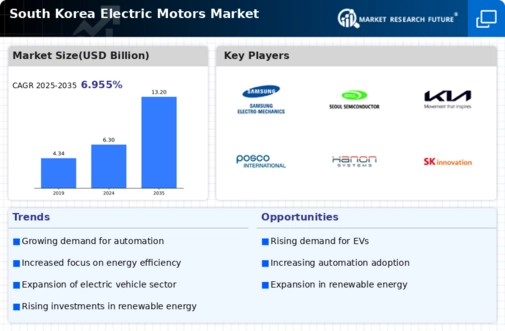Rising Demand for Automation
The electric motors market in South Korea experiences a notable surge in demand due to the increasing adoption of automation across various industries. As manufacturing processes become more sophisticated, the need for efficient and reliable electric motors intensifies. Industries such as automotive, electronics, and food processing are particularly driving this trend. In 2025, the market is projected to grow by approximately 8% annually, reflecting the critical role of electric motors in enhancing productivity and operational efficiency. This rising demand for automation not only boosts the electric motors market but also encourages innovation in motor technology, leading to the development of more advanced and energy-efficient solutions.
Growing Electric Vehicle Market
The burgeoning electric vehicle (EV) market in South Korea serves as a significant catalyst for the electric motors market. With the government's commitment to promoting EV adoption, the demand for electric motors is projected to increase substantially. In 2025, the electric motors market is anticipated to grow by 15% as automakers ramp up production of electric vehicles. Electric motors are integral to EVs, providing the necessary propulsion and efficiency. This growth not only benefits the automotive sector but also stimulates advancements in electric motor technology, positioning the electric motors market as a vital component of the country's transportation future.
Shift Towards Renewable Energy Sources
The shift towards renewable energy sources in South Korea is a pivotal driver for the electric motors market. As the country aims to reduce its carbon footprint, the demand for electric motors in renewable energy applications, such as wind and solar power, is on the rise. In 2025, it is estimated that the electric motors market will see a growth of 12% due to this shift. Electric motors play a crucial role in the operation of renewable energy systems, enhancing efficiency and reliability. This trend not only supports environmental goals but also positions the electric motors market as a key player in the energy sector.
Technological Advancements in Motor Design
Technological advancements in motor design significantly influence the electric motors market in South Korea. Innovations such as brushless DC motors and high-efficiency induction motors are gaining traction, driven by the need for improved performance and energy savings. The market is expected to expand by 9% in 2025, largely due to these advancements. Enhanced motor designs contribute to reduced energy consumption and lower operational costs, making them attractive to various industries. As manufacturers continue to invest in research and development, the electric motors market is likely to witness a wave of new products that meet the evolving demands of consumers.
Government Initiatives for Industrial Growth
The South Korean government actively promotes industrial growth, which significantly impacts the electric motors market. Initiatives aimed at enhancing manufacturing capabilities and technological advancements create a favorable environment for electric motor production. For instance, the government's investment in smart factories and Industry 4.0 technologies is expected to increase the demand for electric motors by 10% over the next few years. These initiatives not only support local manufacturers but also attract foreign investments, further stimulating the electric motors market. The alignment of government policies with industry needs fosters a robust ecosystem for electric motor innovation and production.




















Leave a Comment